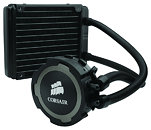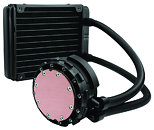Thursday, October 24th 2013

Corsair Announces Hydro Series H75 Liquid CPU Cooler
Corsair, a worldwide designer of high-performance components for the PC hardware market, today announced the Hydro Series H75 dual-fan 120 mm liquid CPU cooler. The easy-to-install H75 provides PC users with quieter and more effective cooling than stock CPU coolers, all in a 120 mm footprint that is widely compatible with most PC cases on the market. The Hydro Series H75 will be available in November at a suggested retail price of $84.99 (USD).
The Hydro Series H75 is comprised of a low-profile CPU cooling block connected to a 120 mm radiator and fan assembly via kink-resistant rubber tubing. The H75's new cooling block is designed with a micro-fin copper cold plate and a high-quality, ceramic bearing pump that provides reliable, low-noise heat transfer away from the CPU. The slim 25 mm thick radiator is surrounded by dual SP120L PWM 120 mm fans resulting in design that is quieter and thinner than other dual fan coolers, and more effective at dispersing heat than single fan designs. The H75's fans work with PWM motherboard fan headers, allowing users to control the fan speed and noise levels from their motherboard's built-in software or BIOS."The H75 is a great choice for PC enthusiasts who want the streamlined features of our H60 120 mm cooler but desire the additional cooling performance of a dual fan design," said Xavier Lauwaert, Director of Product Marketing at Corsair. The Hydro Series H75 features a simple, tool-free mounting system and wide Intel and AMD socket compatibility. Like all Hydro Series liquid CPU coolers, the H75 is completely self-contained and does not require filling or maintenance.
Features and Specifications
Priced at $84.99 MSRP in the United States, the Hydro Series H75 liquid CPU coolers will be available in November from Corsair's worldwide network of authorized distributors and resellers. The cooler is backed with an industry leading five-year limited warranty and Corsair's excellent customer service and technical support.
The Hydro Series H75 is comprised of a low-profile CPU cooling block connected to a 120 mm radiator and fan assembly via kink-resistant rubber tubing. The H75's new cooling block is designed with a micro-fin copper cold plate and a high-quality, ceramic bearing pump that provides reliable, low-noise heat transfer away from the CPU. The slim 25 mm thick radiator is surrounded by dual SP120L PWM 120 mm fans resulting in design that is quieter and thinner than other dual fan coolers, and more effective at dispersing heat than single fan designs. The H75's fans work with PWM motherboard fan headers, allowing users to control the fan speed and noise levels from their motherboard's built-in software or BIOS."The H75 is a great choice for PC enthusiasts who want the streamlined features of our H60 120 mm cooler but desire the additional cooling performance of a dual fan design," said Xavier Lauwaert, Director of Product Marketing at Corsair. The Hydro Series H75 features a simple, tool-free mounting system and wide Intel and AMD socket compatibility. Like all Hydro Series liquid CPU coolers, the H75 is completely self-contained and does not require filling or maintenance.
Features and Specifications
- 120 mm aluminum radiator
120 mm x 152 mm x 25 mm - Two SP120L PWM 120 mm high static pressure fans
120 mm x 25 mm
2000 RPM (+/- 10%)
54 CFM
31.4 dBA - PWM fan control for customizable cooling
- Support for AMD and Intel CPUs
AM2, AM3, FM1, FM2, LGA 1156, 1155, 1150, 1366, 2011 - Advanced copper cold plate and manifold design
- Tool-free bracket for simple installation on most Intel and AMD motherboards
- Sealed all-in-one design, pre-filled and maintenance free
- 5-year limited warranty
Priced at $84.99 MSRP in the United States, the Hydro Series H75 liquid CPU coolers will be available in November from Corsair's worldwide network of authorized distributors and resellers. The cooler is backed with an industry leading five-year limited warranty and Corsair's excellent customer service and technical support.


20 Comments on Corsair Announces Hydro Series H75 Liquid CPU Cooler
H75 = Antec 920
There is plenty of scientific testing to show that CLCs are not a good choice for most PC enthusiasts. Despite this reality many people will buy CLCs and then deal with the consequences of their decision.
Edit: I should clarify. A heatpipe tower typically has better price/performance. You do trade things for it though, namely noise and aesthetics.
IMO the prices have gotten a little bit better. a Noctua NH-D14 is really one of the ONLY coolers that comes close to toeing the line against many top end CLC coolers. But then you have to take into account airflow and ambient temperatures which can skew the end result.
One of the greatest things about a CLC is the choice to mount it ANYWHERE in your case as you see fit, unlike the usual run of the mill heatsink cooler. Placing the Radiator in the front of my case right in front of an intake means that my setup is optimised for the best cooling possible and not effected by ambient temps if it was placed as an exhaust at the back of my case.
Obviously you are some what right. Running a CLC is a risk you take but build quality is generally quite good. Ive only read about a few incidents where a CLC started leaking. Fortunately those stories are few and far between. The risk is always there but I dont think its as fatally dangerous as you make it out to be.
Ive used an Antec 920 and a Corsair H80i and im quite happy with the noise/performance ratio. It really doesnt make a lot of noise but then again I dont use the stock PWM fans that came with my CLC
Price, temperatures, noise. You're only allowed to pick two.
1.gets rid of clutter around the CPU area and RAM clearance issues, much more elegant and clean internals so I wont get bloody knuckles every time I work on my rig.
2. actually very good thermals comparable to some of the best air towers, with a more steady rise in temperature /less spikes vs air. (liquid acts as a better buffer for heat than metal)
3. less of a dust magnet than air towers, which is a pain to clean once the dust gets in there(you have to de-mount the whole tower). I can clean the radiator effectively without removing the water block from the CPU.
4. it doesn't leak fluid, that's why its called a Closed-Loop
5. Bragging rights.
nuff said.
Also, where can I find all that "plenty of scientific testing to show that CLCs are not a good choice for most PC enthusiasts"? Somehow I missed all those as well.
So let us in on your secret, Jorge - where do you get all this inside information that the rest of us can't seem to find?
EDIT - Wait a minute, Jorge, you don't work for Phanteks or some other CLC-less maker of over-priced air coolers, do you? Because that would explain a lot...
I currently have 3 PC's running H60's and an H50 in my wifes rig, have built numerous PC's for friends and family using these coolers and have yet to have a single problem.
These coolers add a nice clean appearance to just about any rig, are efficient, cost effective and IMO are quieter than your standard HSF.
I'm thinking Jorge has never tried one of these awesome devices...:ohwell:
When this one dies out you can insist that 4 gigs of RAM is enough for any gaming system, that should spark another lively debate...or maybe say that anyone who overclocks is gonna burn out their CPU, that should get something going. If you can't inform us, at least you can keep us entertained...
Why did I go with an air cooler, there just a chunk of metal with a fan, almost nothing can go wrong with them, all you have to do is blow them out with compressed air every 4 months, and change the paste once a year. Low maintenance low failure. :rockout: